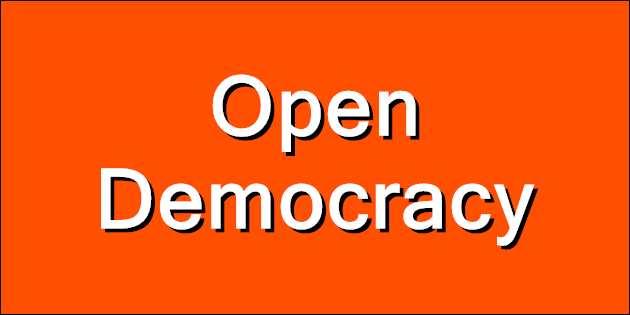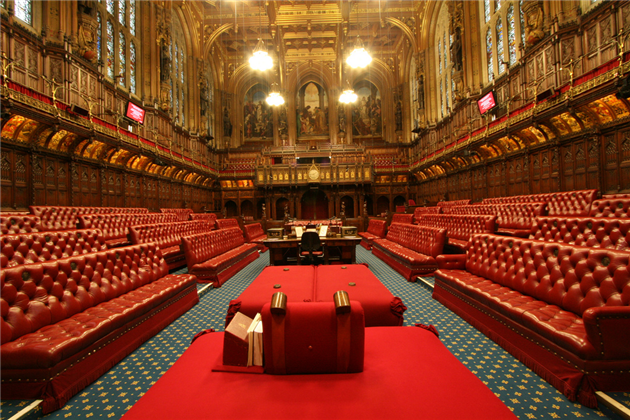Is Sortition Having a Random Moment?
I have long been a proponent of Legislative Service, a specific flavor of sortition where the upper chamber in a bicameral system is replaced by a randomly selected 'jury' on a per-bill basis. You'd serve for a couple of weeks and act as a check and balance on professional politicians who propose the legislation. It might also work well if you find your country in need of a revising body (Bibi, call me). The British government didn't bite, and the concept rarely gets much press, until this week.
In the New York Times, Adam Grant suggests sortition to randomly select politicians:
"In ancient Athens, people had a choice about whether to participate in the lottery. They also had to pass an examination of their capacity to exercise public rights and duties. In America, imagine that anyone who wants to enter the pool has to pass a civics test — the same standard as immigrants applying for citizenship. We might wind up with leaders who understand the Constitution."
Having aced the US citizenship test I'm not sure it's a particularly high bar. I do take the point that we couldn't do much worse than we are now, at least for the top job, but I think there is still a role for professional representation.
Bruce Schneier organized a conference on rethinking democracy. The whole debrief is worth a read, here's the section on sortition:
"Sortition is a system of choosing political officials randomly to deliberate on a particular issue. We use it today when we pick juries, but both the ancient Greeks and some cities in Renaissance Italy used it to select major political officials. Today, several countries—largely in Europe—are using sortition for some policy decisions. We might randomly choose a few hundred people, representative of the population, to spend a few weeks being briefed by experts and debating the problem—and then decide on environmental regulations, or a budget, or pretty much anything."
Much closer to my vision, including having a system of briefing people on the issue. I'd make this adversarial, like a jury trial.
But before this in the US: demolish the electoral college, and then diversify our choice of politicians - either by ranked choice voting or like this.
Related Posts
- Legislative Service
- House of Lords - time for Legislative Service?
- Lottocracy vs Legislative Service
You Might Also Like
(Published to the Fediverse as: Is Sortition Having a Random Moment? #politics #politicalreform #democracy #legislativeservice #sortition Reform democracy via lottery: Sortition covered by Schneier, NYT, Legislative Service. )
Coronation
In 1994 Prince Charles promised to be a defender of faith rather than the faith. The BBC has some disturbing news on his coronation plans:
"Despite changes designed to reflect other faiths, the three oaths the King will take and form the heart of the service remain unchanged, including the promise to maintain "the Protestant Reformed Religion"
Less than half of the UK now claim to be Christian. An established religion is as much of an embarrassing relic as the monarchy itself. This is disappointing, but the shocker is that we're being asked to pledge allegiance:
"The order of service will read: "All who so desire, in the Abbey, and elsewhere, say together: I swear that I will pay true allegiance to Your Majesty, and to your heirs and successors according to law. So help me God."
Modern democracy or Game of Thrones? I personally refuse to bend the fucking knee. At least with his mother there was a polite pretense that the allegiance worked the other way round.
Let's disestablish the Church of England, kick out the lords and elect an upper chamber (or establish legislative service) and re-join the EU as a humble republic.
Related Posts
You Might Also Like
- Enable GZIP compression for Amazon S3 hosted website in CloudFront
- Barker Dam and Wall Street Mill
- Summer Solstice 2023
(Published to the Fediverse as: Coronation #politics #monarchy #brexit #eu #democracy #political reform #legislativeservice The plans for the coronation of King Charles make me double down on freedom of religion and political reform in the UK. )
Open Democracy

I just listened to Ezra Klien interview Hélène Landemore on her idea for political reform: open democracy:
"One in which we let groups of randomly selected citizens actually deliberate and govern. One in which we trust deliberation and diversity, not elections and political parties, to shape our ideas and to restrain our worst impulses."
This is very similar to what I've called legislative service, where a random jury of citizens would replace the Senate. In my vision you still have elected representatives who propose legislation and the panel of citizens acts to approve or deny. In open democracy you retain the benefit of a random selection of citizens presumably immune to corruption but they are debating and proposing laws as well. That's the gist I got from the interview, there is a book as well which I will read at some point.
Ezra raises some good objections, like voters feeling alienated from the decision of a panel that they didn't elect (less of an issue for legislative service than open democracy I think) and also the role of experts in the system (lobbyists as a positive force). I think he gets it wrong on California though:
"We have a pretty robust proposition process here. And I think the broad view is that it has been captured. Special interests get whatever they want on it whenever they want."
The problem is that Uber (or whoever) can pour money into marketing their proposition to the point where you feel you'd be letting down the puppy-saving firefighters if you vote against it (I'm possibly mixing up my ads here). With an adversarial jury style system you'd at least have a group of citizens looking at the actual pros and cons.
The interview is worth a listen, and I'll report back on the book when I read it.
Related Posts
You Might Also Like
(Published to the Fediverse as: Open Democracy #politics #politicalreform #democracy #legislativeservice #opendemocracy Open Democracy is a system proposed by Hélène Landemore that would empower a random jury of citizens to enact legislation. I compare it to Legislative Service which calls on citizens to approve legislation but not propose it. )
Liquid Democracy and united.vote
This November there will be a limited opportunity to put liquid democracy into action. Limited to District 19 of the California Assembly (where I happen to live) and limited to the candidacy of David Ernst (which is a long shot).
Liquid democracy is a referendum on every act, with the difference that you can delegate your vote to someone you trust instead of voting on every issue yourself. At one extreme it's mob rule and at the other (if you delegate your vote to David) it's no different than the current system. The potential magic is where various groups of voters are powerfully represented by someone who is closer to their ideal candidate. If elected David promises to vote based on a liquid democracy implementation at united.vote.
I think functionally liquid democracy shares some problems with proportional representation / transferable vote schemes. If you end up delegating to blocks that represent 40%, 45% and 15% of voters then the 15% block holds the balance of power and gains undue influence. It raises new problems as well. If my elected representative is just doing what my delegate says and I can change my delegate at any time then there aren't really elections any more. So we've replaced 1 representative with N delegates. Delegates are going to raise money to gain and hold onto power and will become beholden to special interests. Are there term limits for delegates? If we end up with a small pool of powerful delegates does it make any difference if I switch my vote to a group of 0.025% of the electorate?
I'm interested in giving it a try though. I like that I can take back control on issues that I particularly care about. I might well vote for David in November.
So what about united.vote?
You have to pay $1 with a credit card to sign up. This is for voter verification and it's not a steep cost but it is a massive conversion barrier. When I signed up today there were just over 1,000 participants. The site is currently oriented around the US Congress rather than the California Assembly. You don't need a password which is nice. Instead you get emailed a one time code each you log in on a new device.
One big missing feature is some sort of directory of prospective delegates. You can delegate to your existing representative (which is pointless) or search for someone you know but really I want to find someone who closely matches my views and who has a good voting record. This isn't possible right now. Until that's fixed you should delegate your vote to me ;)
The voting record is hard to parse as well. For example Kamala Harris, one of my Senators, has an F. For the votes where she has a score it's 100%, 100%, 92% and 15%. Most votes have no liquid democracy opinion attached (is this a 0?). I need to see the math here.
Having said all that my preferred option is legislative service.
(Photo by chuttersnap on Unsplash)
Related Posts
You Might Also Like
- Long term solar powered time lapse camera using Arduino
- Enable GZIP compression for Amazon S3 hosted website in CloudFront
- Full Outlook Web Access on Chromebook
(Published to the Fediverse as: Liquid Democracy and united.vote #politics #liquiddemocracy #legislativeservice Liquid Democracy is coming to the 19th District of the California Assembly this year (maybe). How does it compare to legislative service and other alternatives? )
Lottocracy vs Legislative Service

"There are hard questions about how exactly to structure a political system with lottery-selection at its heart. Here’s one approach, which I am in the process of developing, that I call lottocracy. The basic components are straightforward. First, rather than having a single, generalist legislature such as the United States Congress, the legislative function would be fulfilled by many different single-issue legislatures (each one focusing on, for example, just agriculture or health care)."
It's the same concept as legislative service except randomly selected people serve a single issue for three years rather than just voting on a single bill. I think the advantage is clearly that you get to build up a greater depth of knowledge if you're spending three years learning about health care. The disadvantage is that the number of people willing to give three years of their life is going to be much lower than just asking for the few weeks or months that legislative service would require.
Related Posts
- Legislative Service
- Is Sortition Having a Random Moment?
- House of Lords - time for Legislative Service?
You Might Also Like
- The top four Petitions that will help to Impeach Trump
- What if the Senate Voted Proportionally to Population
- Wave
(Published to the Fediverse as: Lottocracy vs Legislative Service #politics #lottocracy #democracy #legislativeservice #politicalreform Comparing Lottocracy - like a grand jury - and Legislative Service - like a regular jury - as approaches for improving the legislature. )
House of Lords - time for Legislative Service?

I've mulled the idea of having an upper chamber randomly selected from the public like jury service for some time, often over a pint with a friend who prefers to remain nameless. This friend wrote an outstanding letter to Mark Harper which is included below by his kind permission.
Mark Harper didn't manage more than a stock response, and neither did Matthew Offord and so it doesn't seem that the British Government is taking up the concept any time soon. We talked about the e-petition system but it turns out that it's limited to 1,000 characters and submissions are vetted for duplicates. There is an existing e-petition with this idea written by Simon Ferrigno which I've voted for, and if you support the legislative service idea please do the same.
Dear Mr Harper
We understand that you are working with the Deputy Prime Minister on the matter of an elected second chamber. We’re sure that many proposals and reports have crossed your desk on this topic. We’d like to share something we came up with when the issue was initially raised a few years ago. Having kept abreast of developments via media reports, we were both surprised not to hear anything similar mooted.
Our suggestion is that the second chamber be made up of ordinary members of the public drawn from across the country, randomly selected from the electoral roll, typically for up to 2 weeks of service. The system would be administered in a similar way to jury duty, albeit on a national basis. These people would be brought together, put up in decent accommodation, well fed, and otherwise made to feel as if their presence and contribution is both valued and important. They will be tutored, in an unbiased fashion, on the background of the Bill under their consideration. The syllabus could be defined by the civil servants who draw up the legislation under consideration. At this point, a multiple choice test on what they have been taught will be administered, but the results will not be revealed.
After the test, they will have the specifics of the Bill explained to them by two barristers (selected by parties for and against). The barristers will have the ability to bring in subject matter experts (perhaps drawing on the talent pool currently in place in the HOL). At the end of the evidentiary stage, the “constitutional jury” will have the opportunity to debate the issues and pose any further questions they may have to the barristers or witnesses.
Once completed, the constitutional jury will vote on the matter(s) at hand. The only votes that will actually count are those cast by people who passed the multiple choice test (as long as a quorum is reached). The results will only be reported as percentages. No one will ever be told if their vote counted, and all members of the constitutional jury are recorded as having served in deciding the matter.
Among the numerous advantages, as we see them, are:
- Politicians are often heard bemoaning the lack of public engagement with politics. This is an ideal way of re-engaging ordinary members of the public with the business of politics and what happens in Parliament.
- The primacy of the House of Commons will be ensured due to the transience of the members of the second chamber.
- There are no expensive elections to be paid for, nor will anyone’s voting record need to be skewed to ensure their re-election.
- As this chamber will be entirely made up of randomly selected members of the public, there can be no claims of cronyism.
- Voting along party political lines may be reduced; hence the decisions made are those that a random cross section of society deem to be right, rather than the whips.
- As the names of the constitutional jury are not disclosed until after the final voting, lobbying by vested interests will be reduced.
- The second chamber does not necessarily need to be based in London. In fact, there is no reason why it cannot become a travelling roadshow, convening on a rotating basis in major towns and cities around the UK. This may go some way towards quietening some of the accusations that Parliament is London-centric and lessening talk about the Westminster Village.
- Should Parliamentary time be short and the workload high, multiple constitutional juries can be assembled (perhaps in different locations), to work in parallel considering different Bills.
We realise that some members of the House of Lords serve on multiple select committees. We’ll admit to not having a plan for how these will be staffed in the future. One could assume that for now, they can be appointed by Parliament continuing to draw on the talent pool from the current HOL and augmenting any vacancies with new appointments proposed by a committee of civil servants.
We realise that all parties are currently wedded to the idea of an elected second chamber. Is there any way that this could work as a viable alternative?
Yours sincerely...
Photo credit: UK Parliament cc
Related Posts
You Might Also Like
- Lottocracy vs Legislative Service
- Is Sortition Having a Random Moment?
- Bay View and Shoreline Trails at China Camp State Park
(Published to the Fediverse as: House of Lords - time for Legislative Service? #politics #politicalreform #legislativeservice #democracy Legislative Service is the right answer to reforming the House of Lords. )
Legislative Service

Churchill said “Democracy is the worst form of government, except for all those other forms that have been tried from time to time.” and since then we seem to have given up trying to find a better one. Twiddling with the mechanics of voting doesn’t count.
My idea: Legislative Service. This is modeled on Jury Service only instead of judging a person you’re asked to judge a proposed bill. In your typical bicameral system of government the Legislative Service would replace the upper house. The Senate in the US, The House of Lords in the UK.
In a US version 101 citizens would be randomly drafted for each bill. The pros and cons of the bill would be presented in an adversarial environment, much like a jury trial. The citizen legislators would then vote anonymously and either pass the bill or send it back to the House of Representatives. The President would retain the right to veto a bill.
Such a system would castrate the malign influence of money and lobbyists in the political system. It would also improve engagement as more citizens take part or talk to friends and family who have served.
You would still have professional legislators who would be responsible to their constituents. They’d just have a harder time adding pork and returning favors. Each bill would need to be palatable to a majority of average citizens.
Possible objections:
People dodge jury service all the time. Wouldn’t you end up with a similar problem? I don’t think so. Legislative Jury would be far more prestigious.
Isn’t the average voter too stupid to understand complex legislation? You are the average voter. In any case, the adversarial system would give both sides a chance to both argue and explain. Expert witnesses could be called. Ballot measures that are voted on by the entire electorate suffer from this problem as money is spent to over-simplify and obfuscate. In Legislative Service you’re taking a representative sample of the electorate and giving them the time and help needed to make a serious judgment.
It’s unconstitutional! This would require a constitutional amendment.
What about knee-jerk legislation? Tyranny of the Majority? Hopefully this system would help to put a brake on hasty and ill-thought through bills. The President would retain veto power and the Supreme Court would be able to annul unconstitutional decisions and so sufficient checks and balances would remain in the system.
Of course getting rid of The Senate isn’t going to happen overnight. I can think of a couple of ways to start moving in the right direction.
Firstly, this plan is just as applicable at the state level. My state, California, is a mess and this proposal could help. There are rumblings about holding a constitutional convention and if this happens I want us to ditch ballot initiatives and replace the State Senate with Legislative Service.
Secondly, and more plausibly, what about setting up Legislative Service as a non-profit to look at each bill and vote on it but without the actual power of preventing bad bills from being enacted? A sort of non-partisan citizen think tank. If any of my billionaire readers are interested get in touch.
I’ve been mulling the idea of Legislative Service for quite some time, but especially following the atrocious reform of the British House of Lords in 1999 resulting in an upper house composed of appointed peers, a handful of hereditary peers and a few bishops. This threw the independent oversight baby out with the unelected toffs bathwater. Since 1999 I’ve lived in California and my revulsion for the US political climate keeps growing. Serious change is needed. I think Legislative Service is it.
Related Posts
- House of Lords - time for Legislative Service?
- Is Sortition Having a Random Moment?
- Lottocracy vs Legislative Service
You Might Also Like
(Published to the Fediverse as: Legislative Service #politics #politicalreform #churchill #democracy #legislativeservice #california Legislative Service is a form of political reform where the upper chamber is replaced by a jury like process to approve legislation. )


